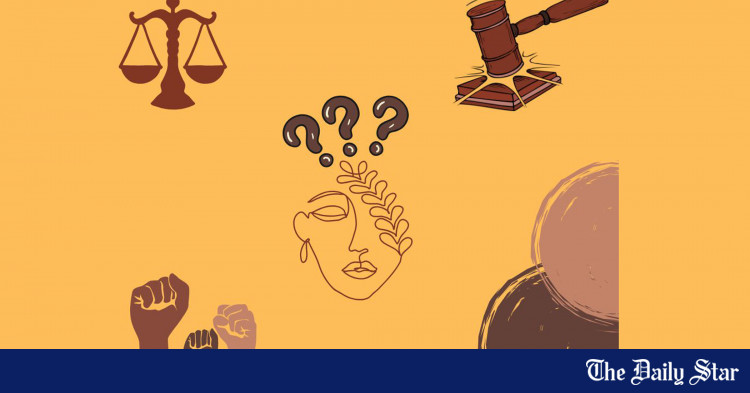Your Advocate
In recognition of the 16 Days of Activism Against Gender-Based Violence, we have gathered a series of queries from our readers over the past month. These inquiries addressed various forms of violence, abuse, and harassment, along with concerns related to gender-specific family obligations. Barrister Omar Khan Joy, a Supreme Court Advocate in Bangladesh and the head of the prestigious law firm ‘Legal Counsel,’ offers detailed responses to these pressing questions. His firm specializes in areas such as commercial law, family law, labor law, land law, constitutional law, criminal law, and intellectual property rights.
Query 1
My name is Y, and I am a clinical medical practitioner. I married my husband in 2021, but after a year, he began verbally, mentally, and physically abusing me for dowry. Despite attempts to resolve the issue through our families, it has remained unresolved. What legal steps can I take?
Response
The forms of abuse you’ve described are serious and cannot be resolved through family mediation. These actions are criminal offenses under Bangladeshi law. The Dowry Prohibition Act, 2018, along with the Women and Children Repression Prevention Act, 2000, addresses dowry-related violence. The Dowry Prohibition Act defines ‘dowry’ as any property demanded or given as a condition of marriage and imposes penalties for related offenses, including imprisonment for up to five years and fines. The Women and Children Repression Prevention Act, 2000 also penalizes dowry-related violence, while the Domestic Violence (Prevention and Protection) Act, 2010 defines domestic violence comprehensively. You can file a First Information Report (FIR) at your local police station to start the legal proceedings.
Query 2
I reside in Rampura, Dhaka, with my family. Next door, a couple is regularly abusing their minor housemaid, leaving her with severe wounds and scars. How can we legally intervene to protect her?
Response
Several laws are in place to protect children from abuse in Bangladesh. Under Section 320 of the Penal Code, 1860, causing grievous harm to a child is punishable. The Children Act, 2013, and the Women and Children Repression Prevention Act, 2000, are significant legislations for preventing violence against children. The latter contains provisions against various offenses involving children. You should file an FIR with the police to initiate legal action. Additionally, you can contact the National Helpline for Violence Against Women and Children (Call or SMS: 109) and gather support from your neighbors or building association to address this issue collectively.
Query 3
My name is ‘X’ Akhter, and I work in a multinational corporation. Recently, I faced sexual harassment from a senior colleague, leaving me shocked and traumatized. What can I do to seek justice?
Response
Thank you for sharing your concern. The landmark case of Bangladesh National Women Lawyers Association (BNWLA) v. Government of Bangladesh (2009) established guidelines to protect women from sexual harassment in workplace settings. It mandates the formation of a sexual harassment redressal committee for investigating complaints, which could lead to disciplinary actions against the harasser. Under various laws, sexual harassment is punishable. You can file an FIR if applicable but should also start by lodging a written complaint with your organization’s redressal committee, or escalate the matter to HR or higher management if such a committee is absent.
Query 4
I am a woman employed in a government office, and I wish to remain anonymous for security reasons. For a few years, some junior colleagues have been spreading harmful rumors about me on social media, damaging my reputation. What legal actions can I take?
Response
The Cyber Security Act, 2023 (CSA) includes provisions against the dissemination of false or harmful information. Section 25(1)(a) specifies that transmitting offensive or false data with malicious intent is a criminal offense, punishable by up to two years in prison or fines. As a preliminary step, you should report this issue to your workplace’s grievance committee. If that fails, consider pursuing legal action through appropriate channels.
Query 5
I am a housewife recently separated from my husband, with two school-age children. My former husband agreed to provide financial support after our divorce, but he has stopped payments. What are my options?
Response
Custody and maintenance issues in Bangladesh fall under the Family Courts Act, 2023 and the Guardians and Wards Act, 1890. Typically, fathers hold legal guardianship, and they remain obligated to provide for their children even if the mother has custody. You can file a suit in the Family Court to secure maintenance payments for your children, ensuring their welfare is prioritized.


